Cognitive Decline in Parkinson’s: Natural Support for Brain Function
Introduction
Parkinson’s disease (PD) is widely recognized for its motor symptoms—tremors, stiffness, slowness—but its effects reach much deeper. Over time, Parkinson’s can also impact cognition, changing how a person thinks, remembers, plans, and reacts. For many, these cognitive changes are among the most distressing aspects of the disease, affecting independence and emotional well-being.
The good news? While Parkinson’s-related cognitive decline can’t be completely prevented, natural strategies, nutrition, and supplements can help protect the brain, slow progression, and enhance mental clarity. Understanding the biological roots of cognitive change—and supporting the brain from multiple angles—can make a profound difference in long-term quality of life.
In this article, we’ll explore how Parkinson’s affects the brain, what drives cognitive decline, and which natural approaches—nutritional, lifestyle, and supplemental—can support sharper thinking, better mood, and overall brain vitality. 🌸
Looking for supplements for This? Click here.
Understanding Cognitive Changes in Parkinson’s Disease
Parkinson’s is caused by the gradual loss of dopaminergic neurons—cells that produce dopamine, a neurotransmitter crucial for movement, motivation, and learning. But Parkinson’s also affects other brain systems, including those responsible for acetylcholine, norepinephrine, and serotonin—all vital for cognition.
These chemical shifts can lead to:
💭 Slower thinking (bradyphrenia)
📘 Memory lapses
⚖️ Difficulty multitasking or making decisions
🧩 Challenges with organization and problem-solving
🌙 Mental fatigue
As Parkinson’s progresses, some people develop mild cognitive impairment (MCI) or even Parkinson’s dementia, but this progression varies widely. Early intervention—through both medical and natural support—can help maintain cognitive function for longer.
Why Cognitive Decline Happens in Parkinson’s 🧬
Several biological mechanisms contribute to cognitive decline in PD:
Dopamine depletion: Disrupts communication between brain regions involved in focus and working memory.
Alpha-synuclein accumulation: Misfolded proteins form clumps (Lewy bodies) that interfere with normal neuron function.
Chronic inflammation: Overactive immune response damages brain cells.
Mitochondrial dysfunction: Impairs cellular energy production, accelerating brain aging.
Oxidative stress: Free radicals damage neurons and reduce neurotransmitter efficiency.
These factors combine to create a “perfect storm” for mental fatigue and cognitive slowing. But this process can be moderated—with the right support. 🌿
The Emotional Toll: Brain Fog and Frustration 😔
Cognitive changes in Parkinson’s don’t just affect thinking—they can also take an emotional toll. Many people describe feeling mentally “slower” or less sharp, leading to frustration or self-doubt.
Common emotional reactions include:
💭 Worry about losing independence
💔 Grief for cognitive abilities once taken for granted
🌫️ Fatigue from mental effort
🧠 Shame or embarrassment in social situations
Recognizing these emotions—and addressing them through therapy, mindfulness, or gentle self-compassion—is an essential part of maintaining brain and emotional health.
Natural Ways to Support Brain Function in Parkinson’s 🌱
While medication remains essential, natural strategies can complement conventional treatment to enhance cognitive function and reduce neurodegeneration.
Nutrition: Feeding the Brain 🥗
The brain is a metabolically hungry organ, and what you eat directly impacts cognitive function.
Key principles:
🌿 Eat anti-inflammatory foods: Vegetables, berries, olive oil, nuts, and fatty fish reduce oxidative damage.
🥦 Prioritize omega-3 fatty acids: Found in salmon, sardines, flaxseed, and chia seeds, they support neuron membranes and reduce inflammation.
🍋 Support mitochondrial health: Nutrients like CoQ10, alpha-lipoic acid, and B vitamins help cells produce energy efficiently.
🍫 Include antioxidants: Dark chocolate, turmeric, green tea, and colorful produce fight free radical damage.
🍎 Maintain stable blood sugar: Avoid refined carbs and excess sugar, which can worsen inflammation and brain fog.
Looking for supplements for This? Click here.
Exercise: The Most Potent Brain Protector 🏋️
Exercise is one of the few interventions proven to slow cognitive decline in Parkinson’s.
It increases brain-derived neurotrophic factor (BDNF)—a protein that promotes neuron repair and growth.
Best types of exercise for Parkinson’s cognition:
Aerobic activity: Walking, swimming, cycling boost dopamine and oxygen flow.
Dance therapy: Enhances coordination, memory, and mood.
Tai Chi or yoga: Combines physical balance with mindfulness and stress reduction.
Resistance training: Supports brain metabolism and strength.
Consistency matters more than intensity—move daily, even if gently.
Sleep: Restoring the Repair Cycle 🌙
Sleep disturbances are common in Parkinson’s, yet they’re vital for cognitive recovery. During deep sleep, the brain clears toxins and consolidates memory.
Tips for better sleep:
🕯️ Keep a consistent bedtime routine.
💤 Limit screens and caffeine in the evening.
🌿 Use calming supplements like magnesium glycinate or L-theanine before bed.
🧘 Try deep breathing or meditation to relax the nervous system.
Cognitive Training: Keep the Brain Active 🧩
Mental exercise strengthens neural pathways—just as physical exercise strengthens muscles.
Try:
🧠 Reading or learning a new language.
🎵 Playing music or solving puzzles.
🗣️ Engaging in stimulating conversations.
🧩 Apps like Lumosity or Elevate for brain training.
Even 15 minutes of mental challenge daily can help keep cognitive circuits sharp.
Stress Reduction: Protecting the Brain from Cortisol 🌤️
Chronic stress accelerates neuron loss and impairs memory. Cortisol, the stress hormone, damages hippocampal cells (the brain’s memory hub).
Mind-body techniques—like meditation, breathwork, and guided relaxation—help calm the nervous system, restore focus, and improve emotional balance.
Want to try Breathwork? Click Here.
Natural Supplements for Cognitive Support 🌿💊

The following supplements have shown promise in supporting cognitive health in Parkinson’s or similar neurodegenerative conditions.
Coenzyme Q10 (CoQ10): Mitochondrial Support
CoQ10 plays a critical role in energy production and acts as an antioxidant, protecting brain cells from oxidative stress.
Studies suggest CoQ10 supplementation may slow functional decline in Parkinson’s by improving mitochondrial efficiency.
🧠 Typical dose: 200–600 mg daily (with meals containing fat).
🌿 Best with: Vitamin E or omega-3s for synergistic antioxidant effects.
Omega-3 Fatty Acids: Brain-Cell Nourishment
EPA and DHA from fish oil improve cell membrane fluidity and neurotransmitter signaling. They also reduce inflammation linked to neurodegeneration.
💧 Dose: 1,000–2,000 mg combined EPA/DHA daily.
🌊 Tip: Choose molecularly distilled fish oil or algae oil for purity.
Alpha-Lipoic Acid (ALA): Antioxidant and Energy Booster
ALA supports mitochondrial energy and recycles other antioxidants like glutathione and CoQ10.
🌿 Dose: 300–600 mg daily.
⚡ Best for: Fatigue, brain fog, and oxidative stress reduction.
Acetyl-L-Carnitine (ALCAR): Neurotransmitter Support
ALCAR enhances mitochondrial energy metabolism and may support acetylcholine—the neurotransmitter of memory and focus.
🧠 Dose: 500–1,000 mg daily, morning or midday.
💫 May improve: Attention, mental clarity, and mood stability.
B Vitamins: Neurotransmitter Builders
B6, B9 (folate), and B12 are vital for dopamine and serotonin production. They also prevent homocysteine buildup, a compound linked to cognitive decline.
🌿 Dose: A methylated B-complex once daily.
💛 Best for: Brain energy, stress tolerance, and neurotransmitter balance.
Magnesium Threonate: The Brain-Calming Mineral
This unique form of magnesium crosses the blood-brain barrier, enhancing synaptic plasticity and improving learning and memory.
🌙 Dose: 1,000–2,000 mg daily, split between morning and night.
🌿 Bonus: Calms anxiety and supports sleep.
Curcumin (Turmeric Extract): Anti-Inflammatory Shield
Curcumin reduces neuroinflammation, protects dopamine neurons, and supports healthy mood.
🌼 Dose: 500–1,000 mg of curcumin (with piperine for absorption).
💫 Best paired with: Omega-3 and Vitamin D for synergistic effects.
Phosphatidylserine: Memory Molecule
Phosphatidylserine (PS) is a natural compound in brain cell membranes that supports communication and memory. It can also lower cortisol and improve mood.
🧩 Dose: 100–300 mg daily.
🌿 Ideal for: Focus, verbal memory, and emotional calm.
Ginkgo Biloba: Circulation and Clarity
Ginkgo enhances blood flow to the brain and protects against oxidative stress. Studies show modest improvements in attention and memory for neurodegenerative conditions.
🍃 Dose: 120–240 mg daily.
⚠️ Note: May interact with blood thinners—consult a doctor.
Lion’s Mane Mushroom: Nerve Growth Factor Booster 🍄
Lion’s Mane stimulates nerve growth factor (NGF), promoting neuron repair and regeneration.
💫 Dose: 1,000–2,000 mg daily.
🌿 Benefits: Cognitive clarity, mood stability, and long-term brain support.
Integrating Natural Support into Your Routine 🌿🧘
Healing the brain requires consistency and patience. Supplements, lifestyle habits, and therapy work synergistically to build long-term resilience.
A simple daily structure might look like this:
🌞 Morning:
CoQ10
Omega-3
B-complex
Alpha-lipoic acid
🌿 Afternoon:
ALCAR
Lion’s Mane mushroom
Curcumin
🌙 Evening:
Magnesium threonate
Phosphatidylserine
Herbal tea for calm (chamomile or lemon balm)
Combine these with:
20–30 minutes of exercise daily
Bright light exposure in the morning
Social or cognitive stimulation (reading, puzzles, conversation)
Evening relaxation routine
The Role of Mindset and Emotional Care 💗
Cognitive decline can challenge identity, confidence, and purpose. That’s why emotional health must be part of brain care.
✨ Therapy: Helps navigate grief, fear, and frustration.
✨ Mindfulness: Reduces cortisol and restores calm.
✨ Connection: Staying socially engaged protects cognition.
✨ Purpose: Meaningful activity gives the brain reason to keep growing.
Your mindset is medicine—nourish it daily.
Final Thoughts 🌿
Cognitive decline in Parkinson’s can feel daunting, but the brain is resilient and adaptable. With the right combination of nutrition, lifestyle, supplements, and emotional care, it’s possible to slow the process, sharpen clarity, and enhance well-being.
While science continues to seek a cure, these natural tools empower you to protect what matters most: your awareness, creativity, and connection to life itself. 💛
Looking for online therapy ? Click Here.
References 📚
Aarsland, D. et al. (2017). Cognitive impairment in Parkinson’s disease: mechanisms and treatment. The Lancet Neurology.
Mischley, L. K. et al. (2015). Nutritional and lifestyle factors influencing Parkinson’s progression. Neurodegenerative Disease Management.
Blesa, J., & Przedborski, S. (2014). Parkinson’s disease: molecular pathways and therapeutic targets. Trends in Neurosciences.
Cacabelos, R. (2017). Mitochondrial dysfunction and cognitive decline in neurodegenerative disorders. International Journal of Molecular Sciences.
Panossian, A., & Wikman, G. (2010). Effects of adaptogens on the central nervous system and stress protection. Pharmaceuticals.
Related Posts
-
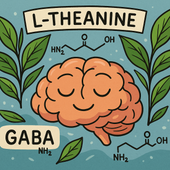
L-Theanine and GABA: Natural Calm for Parkinson’s-Related Anxiety
Anxiety in Parkinson’s often feels overwhelming — a constant inner tension that affects both body and mind. 🌿 This article explores how L-theanine and GABA, two natural compounds that promote relaxation without sedation, can help restore balance, ease restlessness, and calm the nervous system for a more peaceful state of mind. 🌙
-
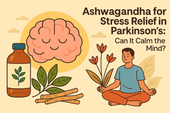
Ashwagandha for Stress Relief in Parkinson’s: Can It Calm the Mind?
Ashwagandha, the ancient Ayurvedic adaptogen, may offer powerful stress relief for people with Parkinson’s. 🌿 By regulating cortisol, calming the nervous system, and supporting dopamine balance, this natural herb helps ease anxiety, improve sleep, and promote emotional stability — restoring calm from the inside out. 🌙
-
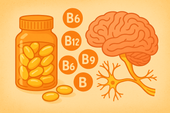
B Vitamins for Mood and Nerve Health in Parkinson’s Patients
B vitamins play a vital role in protecting the brain and nervous system in Parkinson’s. 🌿 From supporting dopamine production to reducing homocysteine and improving mood, these essential nutrients — especially B6, B9, and B12 — help stabilize emotions, boost energy, and preserve nerve integrity for better daily function and mental clarity. 💫
-
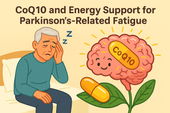
CoQ10 and Energy Support for Parkinson’s-Related Fatigue
Fatigue in Parkinson’s goes far beyond tiredness — it’s a deep cellular exhaustion. ⚡ CoQ10, a natural compound essential for energy production, may help restore vitality by supporting mitochondrial function and protecting brain cells from oxidative stress. Discover how CoQ10 can enhance energy, reduce fatigue, and improve overall resilience in Parkinson’s. 🌿
-
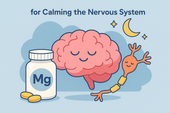
Magnesium for Calming the Nervous System in Parkinson’s
Magnesium is one of the most underrated allies for people with Parkinson’s. 🌿 This calming mineral supports the brain, relaxes tense muscles, and stabilizes the nervous system, helping reduce anxiety, restlessness, and sleep problems. Discover how magnesium nourishes dopamine pathways, protects neurons, and restores a sense of inner peace from within. 💫
-
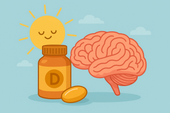
Vitamin D and Mental Health in Parkinson’s: Why Deficiency Matters
Vitamin D is more than a sunshine nutrient — it’s a key player in brain health and emotional balance for people with Parkinson’s. 🌞 This article explores how vitamin D influences dopamine, serotonin, and inflammation, and why deficiency can worsen depression, anxiety, and cognitive decline. Discover how restoring healthy levels can bring clarity, calm, and resilience back to daily life. 🌿
-

Omega-3s and Parkinson’s: Supporting Mood and Cognitive Clarity
Omega-3 fatty acids are among the most powerful nutrients for supporting brain health and emotional well-being in people with Parkinson’s. 🧠 This article explores how omega-3s strengthen neuronal membranes, improve dopamine and serotonin signaling, reduce inflammation, and promote cognitive clarity. Learn how these essential fats can help ease anxiety, lift mood, and protect your mind from oxidative stress naturally. 🌿
-
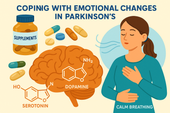
Coping with Emotional Changes in Parkinson’s: Supplements That Support Balance
Emotional changes like anxiety, depression, and irritability are common yet often overlooked symptoms of Parkinson’s disease. This article explores how supplements such as omega-3s, magnesium, and vitamin D can support mood regulation, while therapy and breathwork techniques help restore calm and emotional balance naturally. 🌿
-
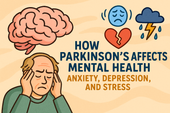
How Parkinson’s Affects Mental Health: Anxiety, Depression, and Stress
Dopamine is the brain’s spark of motivation—the chemical that fuels focus, pleasure, and drive. When dopamine levels are balanced, you feel inspired and alive; when they’re low, everything feels like an uphill climb. Understanding how dopamine works can help you support mental clarity, resilience, and emotional balance naturally. ⚡🧠
-

How Supplements Can Support Therapy and Healing from Co-Dependency
Biology is the science of life—an exploration of how cells, systems, and molecules create the foundation for every thought, emotion, and heartbeat. From the way our DNA shapes us to how hormones and neurons communicate, biology reveals the deep interconnectedness between mind and body. Understanding it helps us appreciate the delicate balance that keeps us alive, aware, and evolving. 🌿🧬
-
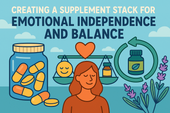
Creating a Supplement Stack for Emotional Independence and Balance
Biochemistry is the invisible language of life—how molecules, cells, and systems communicate to keep your body and mind in balance. From neurotransmitters shaping emotions to enzymes fueling energy, every process in your body reflects biochemical harmony. Understanding these reactions helps you see how nutrition, supplements, and emotions intertwine to support health, mood, and resilience. ⚗️🌿
-
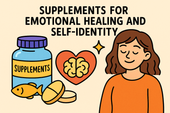
Supplements for Supporting Emotional Healing and Self-Identity
Biology is the bridge between mind and body—the science that explains how cells, hormones, and systems communicate to sustain life. It reveals how emotional states influence physical health, and how nourishment, rest, and movement keep us in balance. Understanding biology helps us reconnect with our natural intelligence and live in harmony with ourselves and the world. 🌿🔬
-
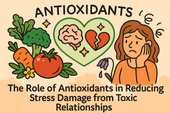
The Role of Antioxidants in Reducing Stress Damage from Toxic Relationships
Biology is the study of life in motion—the intricate dance between cells, systems, and the natural world. From DNA replication to neurotransmitter flow, every process in the human body reflects the intelligence of life adapting and evolving. Understanding this harmony helps us appreciate how nutrition, stress, and environment shape our health and emotional balance. 🌿🔬
-
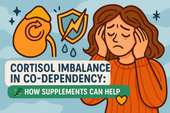
Cortisol Imbalance in Co-Dependency: How Supplements Can Help
Cortisol is the body’s main stress hormone—essential for energy and focus, yet harmful when chronically elevated. When life feels like constant pressure, cortisol imbalance can trigger fatigue, anxiety, and mood swings. Learning how to restore balance through rest, nutrition, and the right supplements can help you rebuild calm, clarity, and resilience from the inside out. 🌿💫
-
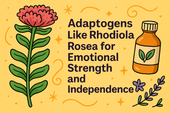
Adaptogens Like Rhodiola Rosea for Emotional Strength and Independence
Adaptogens are nature’s stress-balancing herbs—plants like Rhodiola, Ashwagandha, and Holy Basil that help your body adapt to emotional and physical pressure. They don’t numb or overstimulate; they teach your system how to find calm and stability again. By restoring balance to your hormones, energy, and mood, adaptogens nurture emotional resilience and grounded strength. 🌿✨
-
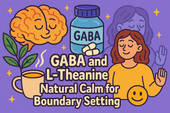
GABA and L-Theanine: Natural Calm for Boundary Setting
Anxiety can feel like a storm inside your mind—constant tension, overthinking, and the inability to relax even when you’re safe. But beneath the chaos, your body is simply trying to protect you. Learning to calm anxiety starts with understanding how your brain and nervous system respond to stress—and how to gently guide them back to peace. 🌿💫
-
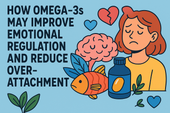
How Omega-3s May Improve Emotional Regulation and Reduce Over-Attachment
Inflammation isn’t just about sore joints or fatigue—it’s also a hidden driver of mood swings, anxiety, and emotional burnout. When chronic stress or poor diet keep the body inflamed, the brain’s chemistry changes, making calm harder to access. Learning how to reduce inflammation through nutrition, rest, and mindful living helps restore balance from the inside out. 🌿💫
-
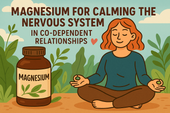
Magnesium for Calming the Nervous System in Co-Dependent Relationships
The nervous system is the body’s communication network, linking your mind and organs through a delicate web of electrical signals. It controls everything from emotional responses to muscle movement—and when it’s overwhelmed by chronic stress or anxiety, balance is lost. Learning how to calm and nourish your nervous system through nutrition, mindfulness, and rest can restore peace and emotional stability. 🌿💫
-

Ashwagandha and Co-Dependency: Supporting Stress Resilience
Stress is more than a feeling—it’s a full-body signal that your system is overwhelmed. When the mind races and the body tenses, your hormones, breathing, and focus all shift into survival mode. Chronic stress doesn’t just affect emotions—it reshapes your nervous system, drains your energy, and clouds your clarity. Learning to understand and manage stress gently is the first step toward peace, balance, and true recovery. 🌿💫
-

Why Co-Dependency Feels Draining: Adrenal Fatigue and Supplements That Help
The adrenal glands are small but powerful organs that sit above your kidneys, acting as your body’s built-in stress managers. They produce hormones like cortisol and adrenaline that help regulate energy, mood, and resilience. When they’re overworked from chronic stress or emotional exhaustion, fatigue and imbalance follow. Supporting adrenal health naturally can help restore calm, energy, and hormonal balance. 🌿⚡
-

The Link Between Anxiety, Co-Dependency, and Natural Support
Anxiety feels like living in constant alert mode—your heart races, your thoughts loop, and your body can’t find peace. It’s the nervous system’s way of preparing for danger, even when none exists. Understanding what’s happening in your mind and body is the first step toward calming the storm and restoring balance. 🌿💫
-

Supplements That Support Dopamine and Serotonin in Co-Dependent Patterns
Serotonin is the neurotransmitter of calm, confidence, and contentment. When it’s balanced, you feel peaceful and emotionally grounded. When it’s low, anxiety, mood swings, and emotional dependence take over. By understanding serotonin’s role in emotional health—and how to support it naturally—you can rebuild inner stability, improve relationships, and cultivate lasting happiness from within. 🌞💫
-

How Emotional Exhaustion in Codependency Impacts the Nervous System
The nervous system is the body’s communication network, connecting the brain to every organ and muscle. It regulates stress, mood, and emotion through a delicate balance of electrical and chemical signals. When overwhelmed, it can become dysregulated—leading to fatigue, anxiety, and emotional imbalance. Understanding how to calm and strengthen the nervous system is key to healing from chronic stress and emotional burnout. ⚡🌿
-

What Is Co-Dependency? The Role of Brain Chemistry and Stress
Stress is more than a feeling—it’s a full-body experience that begins in the brain and ripples through every cell. When cortisol surges and the nervous system stays on alert, your body can’t rest or recover. Over time, this constant tension affects energy, focus, mood, and even immune health. Understanding stress chemistry is the first step toward breaking free from burnout and finding calm again. 🌿
-

Creating a Supplement Stack for Motivation, Energy, and Anti-Procrastination
Motivation is the fuel behind every meaningful achievement—but it’s not just about willpower. It’s a mix of mindset, brain chemistry, and momentum. When energy, focus, and purpose align, action feels natural instead of forced. Learn how to harness motivation as a daily state, not a fleeting feeling.
-

Supplements for Building Consistency and Reducing Chronic Procrastination
Biochemistry is the bridge between biology and chemistry—the science of life at the molecular level. It explains how nutrients, hormones, and neurotransmitters interact to create energy, thought, and emotion. From brain function to muscle movement, biochemistry reveals the invisible processes that sustain health, balance, and vitality.
-

GABA and Procrastination: Supporting Calm Focus for Productivity
GABA is the brain’s natural calming messenger—a neurotransmitter that helps slow mental overactivity and ease stress. When GABA levels drop, focus fades, anxiety rises, and procrastination becomes more likely. By supporting GABA through nutrition, lifestyle, and supplements, you can restore calm clarity, improve focus, and take action with steady, balanced energy.
-

Ashwagandha and Procrastination: Lowering Stress to Improve Action
Science is the language of curiosity and discovery. It helps us understand the hidden patterns behind life, energy, and the universe. Through experimentation and critical thinking, science connects imagination to evidence—turning questions into knowledge. Whether through microscopes, molecules, or minds at work, science represents our endless pursuit of truth and innovation.
-

Neurotransmitters and Motivation: Supplements That Support Drive and Focus
Supplements can do more than boost physical health—they can also enhance mental clarity, focus, and motivation. Nutrients like omega-3s, magnesium, B vitamins, and adaptogens help balance neurotransmitters, stabilize mood, and support brain energy. When combined with good sleep, nutrition, and mindful habits, they can transform how your brain performs under stress.
-

How Stress Hormones Like Cortisol Fuel Procrastination (and What Helps)
Blood sugar isn’t just about physical health—it directly impacts focus, mood, and motivation. When glucose levels spike and crash, energy and attention do the same, fueling procrastination and brain fog. Learning how to stabilize blood sugar through balanced meals, mindful habits, and key nutrients helps keep your mind steady, focused, and ready to act.
-

Brain Fog and Procrastination: Supplements for Mental Clarity
Brain fog can turn even simple tasks into mental hurdles. When your thoughts feel slow and unclear, procrastination often follows—making focus and productivity seem impossible. This article explores the biochemical and lifestyle causes of brain fog and reveals the most effective supplements for restoring mental clarity, focus, and sustained energy.
-

The Link Between Low Energy and Procrastination: Can Supplements Help?
Neurochemistry shapes how we think, feel, and act. When neurotransmitters like dopamine, serotonin, and GABA fall out of balance, it can lead to fatigue, anxiety, or lack of motivation—fueling procrastination and low mood. Understanding the brain’s chemical communication system helps us find ways to restore focus, calm, and emotional stability through nutrition, mindfulness, and targeted supplements.
-

Why Do We Procrastinate? The Role of Dopamine and Supplements That Support It
Dopamine is the brain’s motivation messenger—the chemical that fuels focus, reward, and drive. When dopamine levels drop, even simple tasks can feel impossible to start. This article explores how dopamine shapes procrastination, motivation, and mental energy, along with natural supplements and daily habits that help restore balance and get things done.
-

Phosphatidylserine and Stress Reduction for People with BDD
Stress is more than a mental state—it’s a full-body experience that affects hormones, brain chemistry, and emotional balance. For people with Body Dysmorphic Disorder (BDD), constant tension and worry about appearance can overload the nervous system. Learning how stress works and finding ways to calm it is key to breaking the cycle of anxiety and self-criticism.
-

How Antioxidants Like Vitamin C & E Support Mental Health in BDD
Antioxidants are the body’s natural defense against stress and inflammation. For people with Body Dysmorphic Disorder (BDD), oxidative stress can worsen fatigue, anxiety, and emotional imbalance. Nutrients like Vitamin C and E help protect brain cells, boost neurotransmitter function, and support a calmer, clearer mindset—building a stronger foundation for recovery.
-

Ginkgo Biloba and Memory Support for BDD Recovery
Emotional regulation is the foundation of healing from Body Dysmorphic Disorder (BDD). When the nervous system stays in constant overdrive, even small stressors can trigger self-critical spirals. Learning to calm emotional reactivity helps restore clarity, confidence, and a sense of inner balance. By blending mindfulness, nervous system support, and self-compassion, you can retrain your brain to respond—not react—to emotion.
-

Alpha GPC and Cognitive Function in Body Dysmorphic Disorder
Mental fatigue can feel like your brain has hit a wall—thoughts slow down, focus fades, and motivation disappears. For people with Body Dysmorphic Disorder (BDD), chronic overthinking, emotional stress, and constant self-evaluation can deplete mental energy even further. Understanding what causes this cognitive exhaustion is the first step toward recovery—through rest, balanced nutrition, and targeted brain-supporting supplements.
-

N-Acetyl L-Tyrosine and BDD: Supporting Mental Clarity
Chronic stress doesn’t just affect your mood—it reshapes your brain chemistry, weakens focus, and fuels the obsessive thought loops common in Body Dysmorphic Disorder (BDD). Over time, constant cortisol elevation drains mental energy and emotional balance. Learning to recognize and manage chronic stress is essential to restoring mental clarity, self-compassion, and resilience.
-

Chamomile and Lavender for Calming Obsessive Body Image Thoughts
The nervous system is the command center of our emotional and physical world—and in Body Dysmorphic Disorder (BDD), it often operates in overdrive. Understanding how the brain and body communicate under stress reveals why intrusive thoughts feel uncontrollable. Learning to regulate the nervous system through calm practices, nutrition, and supplements helps restore inner balance and emotional safety.
-

Adaptogens for Body Dysmorphic Disorder: Rhodiola, Ginseng, and More
Rhodiola rosea, often called the “golden root,” is an adaptogenic herb renowned for boosting stress resilience and mental endurance. For individuals with Body Dysmorphic Disorder (BDD), Rhodiola may help reduce fatigue, regulate cortisol, and enhance emotional balance. By supporting both mind and body, this powerful plant promotes calm focus, improved mood, and renewed energy to face daily challenges.
-

B Vitamins for Stress Resilience in BDD: Rebuilding Calm from Within
Biochemistry is at the heart of every thought, emotion, and reaction we experience. In Body Dysmorphic Disorder (BDD), chemical imbalances in neurotransmitters like serotonin, dopamine, and GABA can amplify stress and distort self-perception. Understanding the biochemistry behind mood and stress regulation offers a path toward healing—bridging the gap between emotional experience and the body’s molecular balance.
-

Melatonin and Body Dysmorphic Disorder: Restoring Healthy Sleep Patterns
Melatonin, the body’s natural sleep hormone, plays a vital role in helping people with Body Dysmorphic Disorder (BDD) restore healthy sleep cycles. When anxiety and obsessive thinking interfere with rest, melatonin levels often drop, leading to more emotional reactivity and distorted self-perception. This article explores how melatonin works, why BDD disrupts it, and how natural supplementation—combined with mindful routines—can help the brain and body finally find calm at night.
-

Sleep Struggles with BDD: Supplements for Rest and Recovery
When you’re living with Body Dysmorphic Disorder (BDD), restful sleep can feel impossible—but the right supplements can help reset your body’s natural rhythm. From magnesium and L-theanine to 5-HTP and ashwagandha, these nutrients support relaxation, lower cortisol, and enhance melatonin production. This article explores how supplements can calm the mind, ease nighttime anxiety, and promote true restorative sleep for emotional and physical recovery.
-

5-HTP and Serotonin Balance: Could It Help with Body Dysmorphic Disorder?
Anxiety can feel like a storm inside the mind—restless, overwhelming, and hard to control. In people with Body Dysmorphic Disorder (BDD), anxiety often fuels obsessive thoughts and self-criticism, creating a painful cycle of worry and self-doubt. This article explores the biological roots of anxiety, the role of neurotransmitters like serotonin and GABA, and how natural strategies such as mindfulness, supplements, and nervous system regulation can restore calm and mental clarity.
-

Can Ashwagandha Help Ease Stress and Anxiety in Body Dysmorphic Disorder?
Neurotransmitters like serotonin, dopamine, GABA, and acetylcholine are the chemical messengers that shape how we think, feel, and react to stress. In Body Dysmorphic Disorder (BDD), imbalances in these neurotransmitters can amplify anxiety, obsessive thinking, and emotional distress. This article explores how restoring healthy brain chemistry through nutrition, supplements, and mindfulness can help bring clarity, calm, and emotional stability.
-

L-Theanine for BDD: Finding Calm in the Mind
Neurochemistry plays a central role in how we think, feel, and see ourselves. For those living with Body Dysmorphic Disorder (BDD), imbalances in neurotransmitters like serotonin, dopamine, and GABA can intensify anxiety, obsessive thoughts, and emotional distress. This article explores how regulating brain chemistry through supplements, mindfulness, and lifestyle changes can bring the nervous system back into harmony and restore inner calm.
-

Omega-3 Fatty Acids and Body Image Disorders: Supporting Emotional Health
Omega-3 fatty acids do far more than support heart health—they nourish the brain, stabilize mood, and may ease the emotional turbulence tied to body image disorders like BDD. This in-depth article explores how omega-3s regulate serotonin, dopamine, and inflammation, helping individuals reduce obsessive thoughts and rebuild self-acceptance. It also connects nutrition to therapy, mindfulness, and nervous system balance for holistic emotional healing.
-

Magnesium and BDD: Calming an Overactive Nervous System
Magnesium plays a crucial role in calming an overactive nervous system—something people with Body Dysmorphic Disorder (BDD) struggle with daily. This article explores how magnesium supports relaxation, emotional regulation, and stress reduction while diving into the science behind its connection to brain chemistry. It also examines how combining magnesium supplementation with therapy and breathwork can help rebalance the body’s stress response, reduce obsessive thought patterns, and promote lasting nervous system calm.
-

The Gut-Brain Axis and BDD: Why Probiotics Might Matter
The gut and brain are constantly in conversation — and that dialogue may shape how you experience Body Dysmorphic Disorder. By nurturing your microbiome with probiotics, prebiotics, and gut-healing nutrients, you can help rebalance serotonin, calm anxiety, and restore emotional stability from within 🧠🦠.

















































